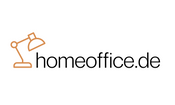Data protection in the home office
Home office and data protection: So you are on the safe side
If someone had claimed two years ago that a large proportion of employees would soon be working from home and that business travel would be replaced by online meetings, this person would probably have been declared crazy. Then Corona came and suddenly everything went very quickly: Now almost every second employee works at least partially in the home office. It will also be an integral part of our working life in the future. This also creates new challenges: especially when it comes to data protection, it is important that you have taken all necessary precautions at home to protect sensitive data from hackers and strangers looking at your screen. We will show you in which professions data protection is particularly important and how employers and employees can ensure that everything runs securely in the home office.
Data protection in the home office - if you are not working with personal data
Let's assume you work as a marketing manager in a large company. Your task is to implement marketing concepts for new products. You are working conceptually and maybe planning advertising activities in various social media channels, but: You are not processing any personal data. In this case you are on the safe side - provided there are no other company agreements. In theory, you can work at the kitchen table and don't have to frantically close the computer when someone enters the room.
But what if you work in accounting, for example, and do the monthly pay slips for your company? Then other rules apply to you, which we will explain in more detail in the next paragraph.
Data protection in the home office - if you work with personal data
The General Data Protection Regulation regulates the handling of sensitive data that can be assigned to individuals. Personal data are, for example, telephone numbers, credit card or personnel numbers, account details of customers or employees, license plates, customer numbers or addresses. If you work with such information in your home office, you have to pay attention to certain things - regardless of a works agreement:
- Use of hardware and software: You may only use hardware and software that your employer has made available to you. Using your private cell phone to answer work while on the go is a no-go.
- Storage of data: Even when storing data, you are not allowed to use private storage media such as your own USB stick. Instead, use the servers or local storage that your employer makes available to you.
- Print documents in the home office: Limit printing to only really necessary prints. If you absolutely have to print a lot, your employer should provide you with a data protection-compliant document shredding device. Otherwise you have to bring printed documents containing personal data to the company for destruction. Under no circumstances should you throw such documents into your household garbage.
- Do not allow access to data: As hard as it sounds, even your family members are not allowed to have access to sensitive data. So letting your child play on the work computer that stores such data is not a good idea. You should also position your screen in the home office in such a way that when someone enters the room, everything is not immediately visible. If you make yourself a coffee in between and leave your seat, you have to switch off your PC or activate a password lock.
Company agreements and support for the home office
All of these rules can of course also apply if you do not work with personal data but have signed a company agreement that makes things binding. In any case, ask your employer about the applicable rules and, if in doubt, ask him whether he can support you in designing your workplace in the home office in compliance with data protection regulations.
The following applies to employers: If you want to be sure about data protection, you should apply a corresponding company agreement for working from home. If you want to support your employees, ask them whether they still need equipment for their home office that complies with data protection regulations. After all, this is not only in the interests of your employee, but also of your company ...
For you to download: The European General Data Protection Regulation in pdf format.
Here you will find the perfect setup for your home office: Discover the homeoffice.de online shop.










